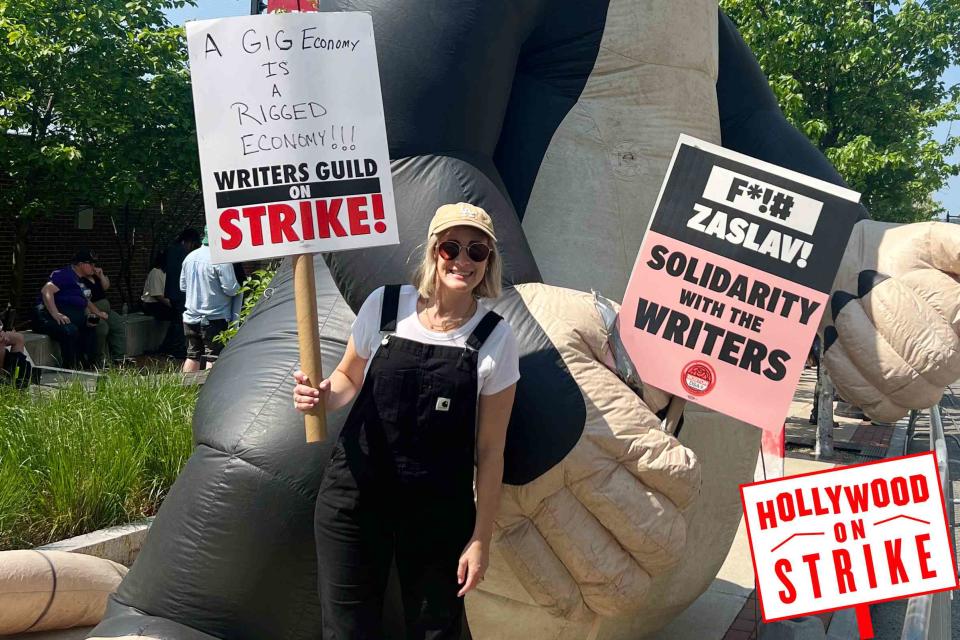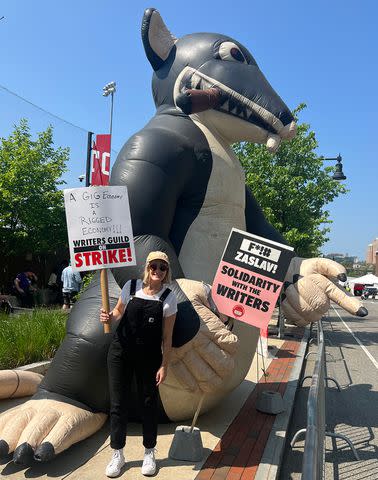Hollywood on Strike: This TV Writer Has Been Juggling Side Gigs to Survive for Years
Screenwriter Annie Stamell predicts writers will hold their ground in their standoff with Hollywood studios: "We can go a long time," she tells PEOPLE

Annie Stamell
For many writers in show business, all that glitters does not translate to gold.
Just ask Annie Stamell, who has spent over a decade climbing the ranks in Hollywood as a writer on TV shows and films. She was already juggling a variety of side jobs to stay afloat when the Writers Guild of America called a strike on May 2.
“The state of our industry has gotten so bad that the strike didn’t change much for me, because I already had to work a side job to support my full-time job,” Stamell — who first broke into the industry as a writer’s assistant on the Bones spinoff The Finder in 2011 — tells PEOPLE.
Stamell, who has penned such shows as YouTube’s Me and My Grandma and Awesomeness TV’s How to Survive a Breakup, moved from Los Angeles to Maine during the pandemic to lower her cost of living. Surviving as a writer in the industry has meant “doing a whole bunch of different things,” she says. “It’s shocking how much our skills are transferable.”

Annie Stamell
Lately, that has meant side gigs in copywriting for an ad agency and brand consulting. “I have some consistent work with a friend who has a small energy consulting company — I helped build her website and do social commenting for her,” she explains. “I also spent some time last year helping high school seniors write their college essays. I do so many different things, but they all pay the bills.”
In late spring, the scribe was on the cusp of a major opportunity, set to take out a feature pitch with a producer of a recent hit Netflix show. With plans made and her flight to Los Angeles purchased, the official halt in business (no active work or sales with studios is allowed during the Writers Guild strike) caught her off guard.
“I just didn’t think a strike was going to happen,” she admits. “I thought, 'Well, our demands are so simple and make so much sense. Why would they ever let us strike over this?' Which was clearly very naive of me. I just thought it was such a no-brainer. We weren't asking for anything crazy.”
Related: Why Daytime Soap Operas Won't Be Impacted by the SAG-AFTRA Strike
The labor union, which represents more than 11,500 entertainment writers who work across film, television, news and online media, announced a strike on May 2, its first since 2007. On Thursday the Screen Actors Guild also went on strike, effectively shutting down Hollywood production. The last time a dual strike was called was in 1960 — when Ronald Reagan led SAG.
Writers cite streaming as a core issue following the implosion of the traditional broadcast and theatrical models, and are seeking a major overhaul in compensation for streaming residuals, as well as higher pay overall, greater protections and a solution to the increase of "mini-rooms," in which a small group of writers pen multiple scripts for a show's potential first season prior to production beginning.
Actors are also seeking better compensation and benefit plans, citing the rise of streaming services and complications resulting from the streaming model contributing to a decline in wages and residuals. They are additionally looking for protections against the impact of AI on their work.
Related: SAG Strike Rules: What Hollywood Actors Can and Can’t Do Until a Resolution Is Reached
Streaming simply doesn’t pay a livable wage, says Stamell, pointing to a pilot she created for YouTube Premium that has been watched “by millions of people.”
“I have not gotten a single residual from that,” she says.
Typically writers forfeit the copyright to their work in exchange for “a piece of the pie in perpetuity,” better known as residuals, she explains. But the streaming model — still categorized in contracts as new media — has allowed studios to sidestep such profit-sharing. “As Fran Drescher said so eloquently, they have changed the business model, therefore, the contracts have to change,” she says.
Never miss a story — sign up for PEOPLE's free daily newsletter to stay up-to-date on the best of what PEOPLE has to offer, from celebrity news to compelling human interest stories.
The screenwriter, who recently married a wine professional and plans to stay in Maine, currently splits her days between freelance jobs and working on a spec script (an independent project she can sell after the strike lifts) with her writing partner. She’s willing to wait out a strike as long as it takes to achieve fair terms.
Meanwhile, threats from the studios are only deepening the writers’ resolve, she says. Earlier this week, an anonymous studio executive told Deadline that “the endgame is to allow things to drag on until union members start losing their apartments and losing their houses.”
The comment soon went viral, but Stamell predicts writers will hold their ground. “We know how to exist without getting paid. The people who don't know are the studio executives, I would wager,” she says. “I don't know a single writer who is like, ‘I'm ready to accept a bad deal.’ “
For more People news, make sure to sign up for our newsletter!
Read the original article on People.

